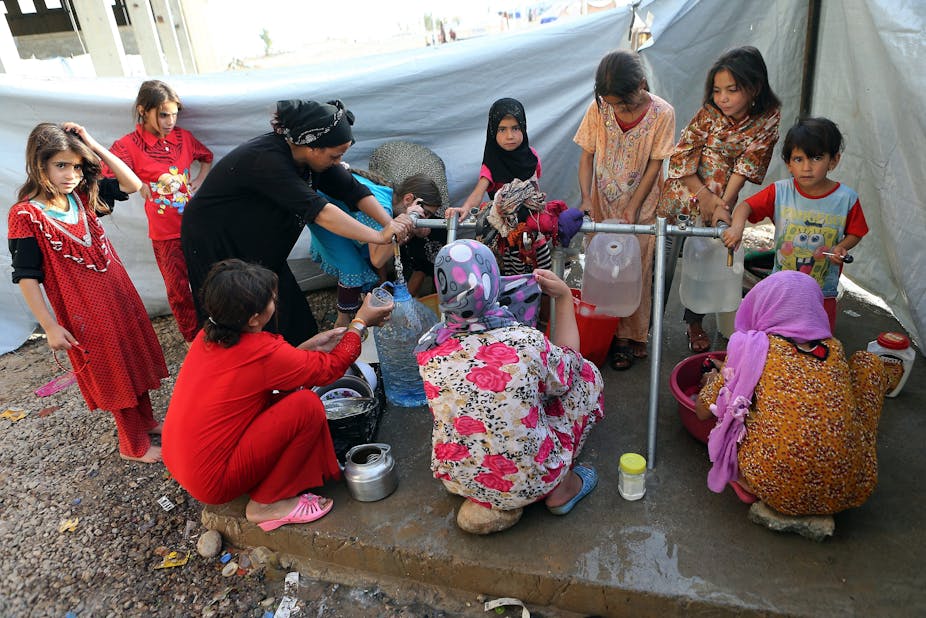To those of us living in Australia, conflict can seem surreal and distant. Yes, we see it on the television, but it is hard to imagine the chaos and horror that accompanies war and conflict. It is not until you talk to someone who has experienced it first-hand that you begin to understand the sense of fear and despair and appreciate the enormity of the problem.
But it is not just a problem for those in far-away lands, as we have been so forcibly reminded by recent events in Australia. This first-hand account by Khosro Ahmad of events in Kurdistan has a sense of immediacy and proximity.
This account is also a timely and heartfelt reminder that the problem is not Islam but radicals who distort the real meaning of Islam. It is a plea for international assistance and a clear statement of thanks for Australia’s commitment and involvement. It is well worth a read.
The following is Khosro Ahmad’s account.
Kurdish survival at stake again
In the 21th century it is beyond imagination to think that people could be mass-murdered and forced out from their land for what they believe. Unfortunately this has become a reality in my country, Iraq.
As a Kurd from the north of Iraq, I was blessed with the opportunity to study in Australia. Exactly one year ago I graduated with a Doctorate in Business Administration from the University of Canberra. The Kurdistan region had achieved significant progress in all areas, and was trying to make up for the past destruction caused by previous wars.
Equipped with the knowledge I obtained in Australia, I looked forward to going back to contribute to rebuilding our nation, which was experiencing relative peace after years of unrest. That hope was short-lived. The peace was shattered when the so-called Islamic State of Iraq and Levant, also known as ISIS or IS, attacked our region.
When they captured Mosul, the third-biggest town in Iraq, we feared that, for the first time since 2003, we could be dragged into another war and that our good times could be over soon. That fear was soon a reality when ISIS advanced within 50 kilometres of our capital city, Erbil.
Upon hearing this news, people started panicking. Some chose to leave and some took up arms and prepared to defend. At home my mother was crying, saying that she didn’t want to leave what we had been building for so many years after our return from exile in Iran in 1999.
For a few days everyone remained alert and informed each other about the latest news. They were ready to leave any minute. There were long queues for petrol because people wanted to fill their cars’ tanks and prepare them for escape.
US and Australia bring hope
Despite all the disappointments and fears, however, there was a glimmer of hope. That was that America and the West would not turn a blind eye to what was happening. We were right.

There is no word to describe how delighted people, and myself, were when we heard the news that American jets had launched a strike against ISIS and forced them to pull back, at least temporarily. People were so grateful that some marched towards the American consulate in Erbil to show their gratitude, holding placards that read “Thank you USA”.
Following the US, other countries such as Australia, the UK and France decided to join the campaign. They also decided to provide weapons to our soldiers, known as Peshmerga. Although ISIS is still at our doorstep, at least for now we are confident that we won’t have to leave as long as US and its allies continue to protect us.
Not everyone was as lucky as we were. Unfortunately, the Yazidi people experienced the brutality of ISIS when the group attacked their town of Shingal. Men were killed and women were kidnaped and sold as slaves. Those who escaped were trapped on a mountain for several days without food and water, and many died due to dehydration.
Radical ideology is a threat to all
All these brutalities were carried out in the name of Islam. The Islam I believe, as a Sunni Muslim, has never approved the killing of innocent people whether Muslim or non-Muslim. The Islam we know is the religion of peace not violence.
We do not need these ill-minded people to come and tell us what Islam is. It is important that non-Muslims should distinguish between radical Islam and the real Islam. The real Islam condemns violence and terror. In fact, the holy book of Quran has warned Muslims that unjustly taking the life of one human being is equal to killing all of humanity.
Some have criticised America and Western countries’ decision to intervene and strike ISIS. Although ISIS is far away from those countries, at least for now its ideology cannot be stopped from reaching them, which will consequently bring the threat to their doorstep.
Allowing ISIS to grow will eventually bring the war to the West because ISIS is not just an enemy of the Iraqi people. It is an enemy of all against its ideology. Therefore, international cooperation is required to tackle them and both Muslims and non-Muslims must work together to stop the spread of radical Islam.
As a Kurdish citizen, I am grateful to the Australian government for making the decision to help my people both by providing humanitarian aid and by joining the US in striking ISIS. This would be appreciated by all the people in Iraq, particularly Kurds who have once experienced dispersion and do not wish to suffer it again.
The co-author of this article, Khosro Ahmad, was awarded his Doctorate in Business Administration from the University of Canberra in 2013. His research thesis was “Determinants of e-government adoption: An empirical investigation in the Kurdistan region of Iraq”.

